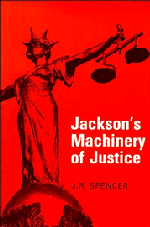Book contents
- Frontmatter
- Contents
- Acknowledgements
- List of figures
- List of tables
- Preface
- Preface to the first edition of ‘The Machinery of Justice in England’
- Abbreviations
- I Historical introduction
- II Civil jurisdiction
- III Tribunals
- IV Criminal jurisdiction
- V The personnel of the law
- 27 Solicitors
- 28 Barristers
- 29 Legal education
- 30 Should the profession continue to be divided into barristers and solicitors?
- 31 Judges
- 32 Juries
- 33 Lay justices and stipendiary magistrates
- 34 The administration of the courts
- VI The European dimension
- VII The cost of the law
- VIII Law Reform
- Appendix A The Report of the Civil Justice Review
- Table of Cases cited
- Table of Statutes cited
- Table of Stationery Office publications cited
- Index
32 - Juries
Published online by Cambridge University Press: 10 January 2011
- Frontmatter
- Contents
- Acknowledgements
- List of figures
- List of tables
- Preface
- Preface to the first edition of ‘The Machinery of Justice in England’
- Abbreviations
- I Historical introduction
- II Civil jurisdiction
- III Tribunals
- IV Criminal jurisdiction
- V The personnel of the law
- 27 Solicitors
- 28 Barristers
- 29 Legal education
- 30 Should the profession continue to be divided into barristers and solicitors?
- 31 Judges
- 32 Juries
- 33 Lay justices and stipendiary magistrates
- 34 The administration of the courts
- VI The European dimension
- VII The cost of the law
- VIII Law Reform
- Appendix A The Report of the Civil Justice Review
- Table of Cases cited
- Table of Statutes cited
- Table of Stationery Office publications cited
- Index
Summary
Nothing in the whole of the English legal system generates so much heated and emotional argument as the merits and demerits of the jury. No debate on the subject is complete without a few eulogistic remarks on the value of juries quoted from lawyers of the past. These are apt to mislead us unless we bear in mind two vital facts which are usually forgotten. The first is that the composition of juries has changed dramatically over the years, and in particular since the Criminal Justice Act 1972 abolished the property qualification and made eligible for jury service almost everyone who is entitled to vote in elections. The second is that their place and function within the legal system has also dramatically changed.
To take the second point first, jury trial used to be almost universal as a method of deciding cases, both civil and criminal, whereas now it is applicable to only a small fraction of either. The position in the eighteenth century was that a trial by jury was the method of determining any civil action for debt or damages brought in one of the courts of common law, which is to say that they were used for the overwhelming majority of civil cases.
- Type
- Chapter
- Information
- Jackson's Machinery of Justice , pp. 382 - 401Publisher: Cambridge University PressPrint publication year: 1989

